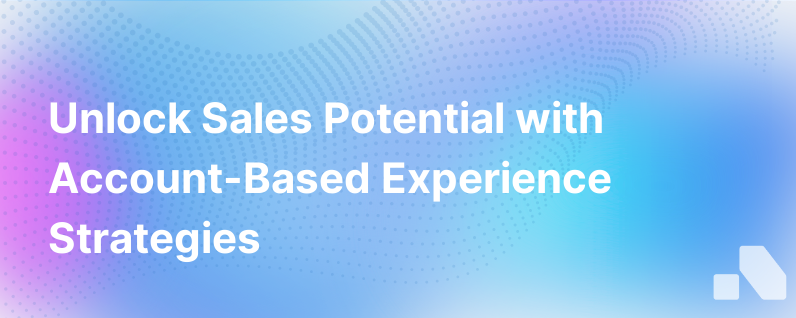
In an era where the average B2B customer now uses six different interaction channels throughout the decision-making process, it becomes increasingly complex for sales teams to engage effectively and capture their attention. This is where Account-Based eXperience (ABX) steps into the limelight, pivoting the traditional sales approach into a more strategic, targeted, and customer-centric strategy.
Here’s a deep dive into the 'what', 'why', and most importantly, 'how' of Account-Based eXperience, elucidating its pivotal role in the current sales landscape.
What is Account-Based eXperience (ABX)?
ABX is a go-to-market strategy that orchestrates personalized marketing, sales, and success efforts to land and expand at high-value accounts. This method is more than just sales or marketing alone – it's a concerted effort across company teams to provide a holistic and tailored sales experience to each account.
The core of ABX lies in its data-driven approach. It seeks to align and personalize the buyer's journey by focusing rigorously on customer data and insights, thus enabling a seamless customer experience. The strategy banks on quality over quantity, targeting fewer, more strategic accounts with highly personalized campaigns rather than a broad-based push.
Why Should Sales Teams Care About ABX?
1. Sharper Focus on High-Value Accounts
Sales resources are finite. ABX enables sales teams to focus their energy on accounts with the highest revenue potential or strategic value. By targeting the right prospects at the right time, with the right message, sales teams can optimize their processes and efforts for maximum impact.
2. Alignment Across Teams
ABX isn't a solo mission for the sales department but rather a unified front across marketing, sales, and customer success teams. Aligning these teams towards common goals and strategies ensures a seamless experience for the customer and a more cohesive approach internally.
3. Personalization at Scale
Today's buyers expect more than a one-size-fits-all solution. They seek personal interaction and solutions tailor-made to their needs. ABX leverages deep data insights to craft personalized messages and offerings that resonate with individual decision-makers, driving higher conversion rates.
4. Enhanced Customer Experience
With ABX, the buyer's journey is no longer peppered with irrelevant touchpoints. Instead, every interaction is crafted with the account's specific needs and preferences in mind, building a more positive and memorable customer experience.
5. More Informed Decision-Making
Thanks to the data-centric nature of ABX, sales reps are now armed with a treasure trove of intelligence on their accounts. This information allows for more strategic conversations and facilitates better decision-making in the sales process.
6. Increased Customer Lifetime Value (CLV)
ABX doesn't stop with the sale—it emphasizes nurturing the relationship, delivering value post-sale, and seeking opportunities for upsell or cross-sell. This sustained engagement not only boosts retention but also increases the lifetime value of the customer.
7. Better Measurement and ROI
Clear targeting and personalization make it easier to measure ABX efforts' impact. Sales teams can more accurately assess the return on investment, linking specific ABX activities to revenue generation.
How Can Sales Teams Implement ABX?
Embedding ABX within an organization requires commitment, investment in the right technology, and a culture change to become more customer-centric. Here are steps and best practices to guide sales teams:
Cultivate a Collaborative Mindset: Encourage an organizational culture where marketing, sales, and customer success teams work together rather than in silos, sharing insights and strategies to approach accounts collectively.
Leverage Data for Insights: Use advanced analytics and AI-driven platforms to gather and interpret relevant customer data that can inform tailored strategies for each account.
Map the Customer Journey: Create detailed journey maps for accounts, identifying key touchpoints, pain points, and opportunities for engagement.
Personalize Interactions: Use the data and journey mapping to deliver personalized content, recommendations, and solutions at every stage of the buyer's journey.
Measure and Optimize: Establish clear metrics for ABX efforts and continuously measure the effectiveness. Based on these analytics, optimize strategies for even better engagement.
Leverage Technology: Tools like Aomni can be pivotal in implementing ABX, as they provide up-to-date account intelligence, automate data collection and analysis, streamline communications across teams, and facilitate personalized engagement strategies – all in one platform.
Conclusion
In conclusion, embracing Account-Based eXperience (ABX) marks a strategic pivot for sales teams from a volume-focused approach to a value-driven one. It entails a fundamental shift in how accounts are targeted, nurtured, and grown. The power of personalization, combined with the rigor of data analysis and cross-functional alignment, makes ABX a compelling approach for sales teams aiming for the zenith of efficiency and effectiveness in today's crowded B2B marketplace. By adopting ABX, sales teams can ensure that their efforts are not just heard but truly resonate with their targets, leading to mutually beneficial, enduring business relationships. Implementing tools like Aomni may just be the catalyst needed for sales teams to transition into this sophisticated new era of targeted selling.